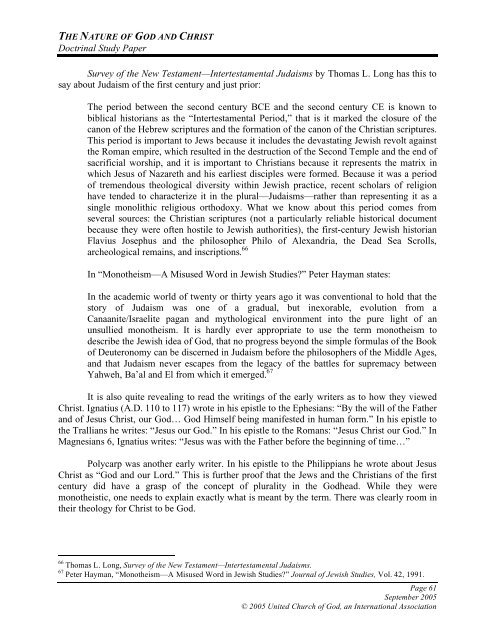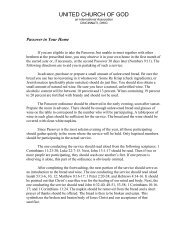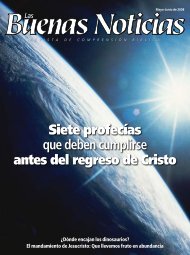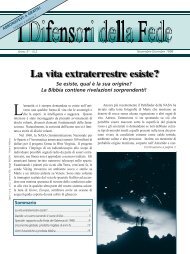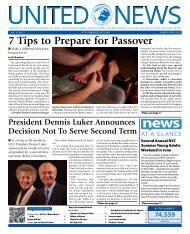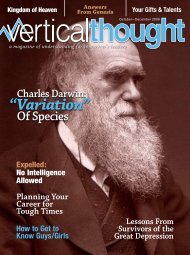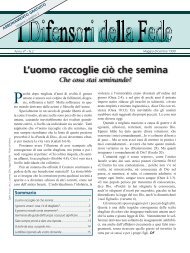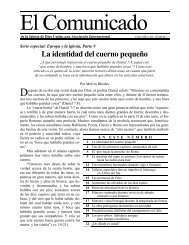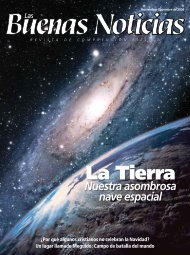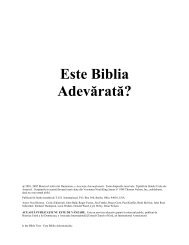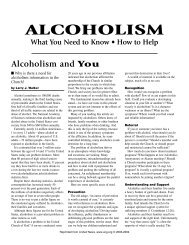The Nature of God and Christ - Members Site - United Church of God
The Nature of God and Christ - Members Site - United Church of God
The Nature of God and Christ - Members Site - United Church of God
- No tags were found...
You also want an ePaper? Increase the reach of your titles
YUMPU automatically turns print PDFs into web optimized ePapers that Google loves.
THE NATURE OF GOD AND CHRISTDoctrinal Study PaperSurvey <strong>of</strong> the New Testament—Intertestamental Judaisms by Thomas L. Long has this tosay about Judaism <strong>of</strong> the first century <strong>and</strong> just prior:<strong>The</strong> period between the second century BCE <strong>and</strong> the second century CE is known tobiblical historians as the “Intertestamental Period,” that is it marked the closure <strong>of</strong> thecanon <strong>of</strong> the Hebrew scriptures <strong>and</strong> the formation <strong>of</strong> the canon <strong>of</strong> the <strong>Christ</strong>ian scriptures.This period is important to Jews because it includes the devastating Jewish revolt againstthe Roman empire, which resulted in the destruction <strong>of</strong> the Second Temple <strong>and</strong> the end <strong>of</strong>sacrificial worship, <strong>and</strong> it is important to <strong>Christ</strong>ians because it represents the matrix inwhich Jesus <strong>of</strong> Nazareth <strong>and</strong> his earliest disciples were formed. Because it was a period<strong>of</strong> tremendous theological diversity within Jewish practice, recent scholars <strong>of</strong> religionhave tended to characterize it in the plural—Judaisms—rather than representing it as asingle monolithic religious orthodoxy. What we know about this period comes fromseveral sources: the <strong>Christ</strong>ian scriptures (not a particularly reliable historical documentbecause they were <strong>of</strong>ten hostile to Jewish authorities), the first-century Jewish historianFlavius Josephus <strong>and</strong> the philosopher Philo <strong>of</strong> Alex<strong>and</strong>ria, the Dead Sea Scrolls,archeological remains, <strong>and</strong> inscriptions. 66In “Monotheism—A Misused Word in Jewish Studies?” Peter Hayman states:In the academic world <strong>of</strong> twenty or thirty years ago it was conventional to hold that thestory <strong>of</strong> Judaism was one <strong>of</strong> a gradual, but inexorable, evolution from aCanaanite/Israelite pagan <strong>and</strong> mythological environment into the pure light <strong>of</strong> anunsullied monotheism. It is hardly ever appropriate to use the term monotheism todescribe the Jewish idea <strong>of</strong> <strong>God</strong>, that no progress beyond the simple formulas <strong>of</strong> the Book<strong>of</strong> Deuteronomy can be discerned in Judaism before the philosophers <strong>of</strong> the Middle Ages,<strong>and</strong> that Judaism never escapes from the legacy <strong>of</strong> the battles for supremacy betweenYahweh, Ba’al <strong>and</strong> El from which it emerged. 67It is also quite revealing to read the writings <strong>of</strong> the early writers as to how they viewed<strong>Christ</strong>. Ignatius (A.D. 110 to 117) wrote in his epistle to the Ephesians: “By the will <strong>of</strong> the Father<strong>and</strong> <strong>of</strong> Jesus <strong>Christ</strong>, our <strong>God</strong>… <strong>God</strong> Himself being manifested in human form.” In his epistle tothe Trallians he writes: “Jesus our <strong>God</strong>.” In his epistle to the Romans: “Jesus <strong>Christ</strong> our <strong>God</strong>.” InMagnesians 6, Ignatius writes: “Jesus was with the Father before the beginning <strong>of</strong> time…”Polycarp was another early writer. In his epistle to the Philippians he wrote about Jesus<strong>Christ</strong> as “<strong>God</strong> <strong>and</strong> our Lord.” This is further pro<strong>of</strong> that the Jews <strong>and</strong> the <strong>Christ</strong>ians <strong>of</strong> the firstcentury did have a grasp <strong>of</strong> the concept <strong>of</strong> plurality in the <strong>God</strong>head. While they weremonotheistic, one needs to explain exactly what is meant by the term. <strong>The</strong>re was clearly room intheir theology for <strong>Christ</strong> to be <strong>God</strong>.66 Thomas L. Long, Survey <strong>of</strong> the New Testament—Intertestamental Judaisms.67 Peter Hayman, “Monotheism—A Misused Word in Jewish Studies?” Journal <strong>of</strong> Jewish Studies, Vol. 42, 1991.Page 61September 2005© 2005 <strong>United</strong> <strong>Church</strong> <strong>of</strong> <strong>God</strong>, an International Association


